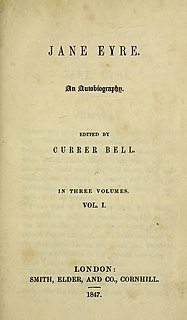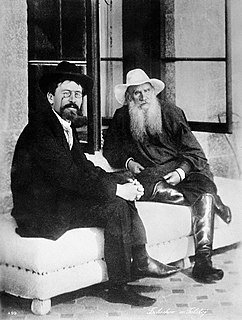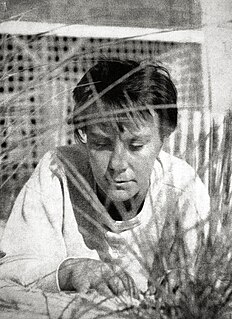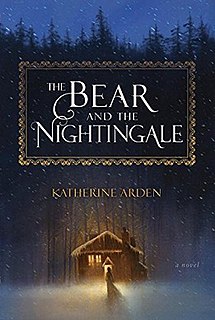
Jane Eyre is a novel by the English writer Charlotte Brontë. It was published under her pen name "Currer Bell" on 16 October 1847 by Smith, Elder & Co. of London. The first American edition was published the following year by Harper & Brothers of New York. Jane Eyre is a Bildungsroman which follows the experiences of its eponymous heroine, including her growth to adulthood and her love for Mr Rochester, the brooding master of Thornfield Hall.

Russian literature refers to the literature of Russia and its émigrés and to Russian-language literature. The roots of Russian literature can be traced to the Middle Ages, when epics and chronicles in Old East Slavic were composed. By the Age of Enlightenment, literature had grown in importance, and from the early 1830s, Russian literature underwent an astounding golden age in poetry, prose and drama. Romanticism permitted a flowering of poetic talent: Vasily Zhukovsky and later his protégé Alexander Pushkin came to the fore. Prose was flourishing as well. Mikhail Lermontov was one of the most important poets and novelists. The first great Russian novelist was Nikolai Gogol. Then came Ivan Turgenev, who mastered both short stories and novels. Fyodor Dostoevsky and Leo Tolstoy soon became internationally renowned. Other important figures of Russian realism were Ivan Goncharov, Mikhail Saltykov-Shchedrin and Nikolai Leskov. In the second half of the century Anton Chekhov excelled in short stories and became a leading dramatist. The beginning of the 20th century ranks as the Silver Age of Russian poetry. The poets most often associated with the "Silver Age" are Konstantin Balmont, Valery Bryusov, Alexander Blok, Anna Akhmatova, Nikolay Gumilyov, Sergei Yesenin, Vladimir Mayakovsky, and Marina Tsvetaeva. This era produced some first-rate novelists and short-story writers, such as Aleksandr Kuprin, Nobel Prize winner Ivan Bunin, Leonid Andreyev, Fyodor Sologub, Yevgeny Zamyatin, Alexander Belyaev, Andrei Bely and Maxim Gorky.

Nelle Harper Lee was an American novelist best known for her 1960 novel To Kill a Mockingbird. It won the 1961 Pulitzer Prize and has become a classic of modern American literature. Lee has received numerous accolades and honorary degrees, including the Presidential Medal of Freedom in 2007 which was awarded for her contribution to literature. She assisted her close friend Truman Capote in his research for the book In Cold Blood (1966). Capote was the basis for the character Dill Harris in To Kill a Mockingbird.

"De Brevitate Vitae", more commonly known as "Gaudeamus igitur" or just "Gaudeamus", is a popular academic commercium song in many European countries, mainly sung or performed at university and high-school graduation ceremonies. Despite its use as a formal graduation hymn, it is a jocular, light-hearted composition that pokes fun at university life. The song is thought to originate in a Latin manuscript from 1287. It is in the tradition of carpe diem with its exhortations to enjoy life. It was known as a beer-drinking song in many early universities and is the official song of many schools, colleges, universities, institutions, student societies and is the official anthem of the International University Sports Federation.

People Will Talk is a 1951 American romantic comedy/drama film directed by Joseph L. Mankiewicz and produced by Darryl F. Zanuck from a screenplay by Mankiewicz, based on the German play by Curt Goetz, which was made into a movie in Germany. Released by Twentieth Century Fox, it stars Cary Grant and Jeanne Crain, with supporting performances by Hume Cronyn, Finlay Currie, Walter Slezak and Sidney Blackmer.

Illegitimi non carborundum is a mock-Latin aphorism, often translated as "Don't let the bastards grind you down". The phrase itself has no meaning in Latin and can only be mock-translated.

Elaine Feinstein was an English poet, novelist, short-story writer, playwright, biographer and translator. She joined the Council of the Royal Society of Literature in 2007.

Netochka Nezvanova is an unfinished novel by Fyodor Dostoevsky. It was originally intended as a large scale work in the form of a 'confession', but a background sketch of the eponymous heroine's childhood and adolescence is all that was completed and published. According to translator Jane Kentish, this first publication was intended as "no more than a prologue to the novel". Dostoevsky began work on the novel in 1848 and the first completed section was published at the end of 1849. Further work was prevented by the author's arrest and exile to a Siberian detention camp for his part in the activities of the Petrashevsky Circle. After his return in 1859, Dostoevsky never resumed work on Netochka Nezvanova, leaving this fragment forever incomplete.

Spouses Maryna Yuryivna Dyachenko and Serhiy Serhiyovych Dyachenko are co-authors of fantasy literature from Ukraine writing in Russian.

Science fiction and fantasy have been part of mainstream Russian literature since the 19th century. Russian fantasy developed from the centuries-old traditions of Slavic mythology and folklore. Russian science fiction emerged in the mid-19th century and rose to its golden age during the Soviet era, both in cinema and literature, with writers like the Strugatsky brothers, Kir Bulychov, and Mikhail Bulgakov, among others. Soviet filmmakers, such as Andrei Tarkovsky, also produced many science fiction and fantasy films. With the fall of the Iron Curtain, modern Russia experienced a renaissance of fantasy. Outside modern Russian borders, there are a significant number of Russophone writers and filmmakers from Ukraine, Belarus and Kazakhstan, who have made a notable contribution to the genres.

Dark Planet is a two-part Russian science fiction film directed by Fyodor Bondarchuk. The film was adapted by Marina and Sergey Dyachenko from the 1969 novel by Arkady and Boris Strugatsky of the same Russian name, published in English as Prisoners of Power; a part of the Noon Universe series. It is a dystopian story set on post-apocalyptic planet Saraksh, ruled by a totalitarian regime that brainwashes its citizens. Maxim Kammerer, a space explorer from Earth, crash-lands on Saraksh and becomes involved in the planet's everboiling politics. The movie was released as two separate films, in December 2008 and April 2009, respectively.

The Secret Series is a series of adventure novels written by Enid Blyton. There are six books, as follows:

The FantLab's book of the year award are a set of awards given annually for the best science fiction or fantasy works published in Russia during previous year. The awards are named after FantLab web site.

Andriy Valentynov is the pen name of a Ukrainian Russian-speaking science/fantasy fiction writer Andriy Valentynovich Shmalko. Valentynov is distinguished Ukrainian historian and archaeologist and works as an associate professor at Ukrainian studies department of Kharkiv National University. He resides in Kharkiv, Ukraine, and writes in Russian. Valentinov collaborates with other Russophone Ukrainian writers, such as H. L. Oldie and Marina and Sergey Dyachenko.

The Fireman is a post-apocalyptic novel by American author Joe Hill. The novel, his fourth, tells the tale of a deadly spore that has infected most of the world's population. Hill first spoke of the novel in 2013 in promotional interviews for his then-new novel NOS4A2. The novel was released on May 17, 2016.

Hot Ice is a 2009 television series produced by Star Media which aired on Channel One

In Motion is a 2002 Russian drama film, directorial debut of Filipp Yankovsky. Its plot shares some similarities to La Dolce Vita by Federico Fellini.

The Admirer is a 1999 Russian thriller film directed by Nikolai Lebedev.

The Bear and the Nightingale is a historical fantasy novel written by Katherine Arden. It is Arden's debut novel, and the first novel in the Winternight trilogy. The Bear and the Nightingale is set in medieval Russia and incorporates elements of Russian folklore. The central character is a young girl, Vasya Petrovna, who is able to communicate with mythological creatures, at a time when Orthodox Christianity is attempting to stamp out all belief in such beings.



















